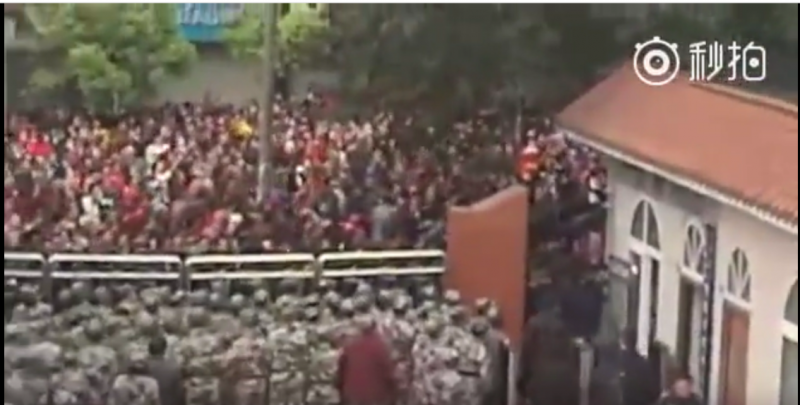Chinese social media has been in uproar for a week after a video showing the dead body of a 14-year-old student lying on the ground went viral. The tight-lipped reaction of local authorities, who have cracked down on those discussing the case, has only seemed to feed the fire.
The incident happened on 1 April in Luxian, Luzhou City, Sichuan Province. The student, identified by his surname Zhao, attended Taifu Middle School. Speculation quickly spread about the manner of his death.
The following day, local authorities claimed that there wasn’t any evidence that Zhao’s death was a homicide. And on 3 April, Luxian police arrested four netizens for having “incited the public and severely disturbed public order.”
But many still believed that the boy was a victim of campus violence. The most widely shared theory was that Zhao was beaten to death by five other students for not paying protection dues of 10,000 yuan ($1,450) to a local group of bullies.
The case attracted crowds near the school, demanding that authorities disclose details, including the school’s closed circuit television footage. Below is video showing those gathered:
In response, local authorities blocked roads entering Luxian. A week later, they continue to crack down on “rumors” surrounding the incident and prevent journalists from interviewing students, school officials and the victim’s family, at the same time as refusing to provide the public any evidence that Zhao’s death was indeed an accident.
Even state-affiliated media outlets are getting impatient and slammed local authorities for blocking reporters from interviewing Zhao’s family. Xinhua News reporters wrote:
4月4日,记者好不容易突破制约跑了20多公里村道前去采访死者的爷爷奶奶和同学时,被跟随的“尾巴”招来一批镇村干部,实施各种暗示威胁干扰,迫使采访对象不敢说真话。而记者被当地的种种电话骚扰则更是到了无法忍受的地步。
On 4 April, reporters took the village route for 20 kilometers to avoid the road block and interview the victim’s grandparents and classmates. But they were tailed by the village officials who intervened in our interviews with all kinds of threats. All the interviewees refused to talk. Reporters also received excessive telephone harassment.
The report also quoted netizens from popular social media platform Weibo and urged local authorities to address public concerns:
你们都没有尸检,就排除了他杀了?你们现在又说静待结果!前后矛盾!
[The authorities] have not even conducted the autopsy. How could they rule out homicide? Now you asked us to wait, so full of contradictions!
高空坠亡只是死亡原因,什么时候可以作为证据排除他杀了?难道没有因人为外力导致坠亡的可能性?死者如果自杀请问遗书在哪?如果有校园暴力请问那几个校霸审问了吗?警方如此敷衍判案能平民愤?
Falling to death is the consequence, how can it be used to rule out a homicide? The fall can be caused by outside forces. If it is suicide, where is the suicide note? If the case involves school bullies, shouldn’t the police officers interrogate them? How can they conclude the case so quickly without addressing people’s concern?
The hardhanded reaction of local authorities has made people more and more skeptical. A Weibo user expressed his frustration:
泸州事件的真相是什么?越来越魔幻了,国度越来越魔幻了,很多人不说话了,也不能说话了,只剩一群小粉红在伪高潮…,也是无比恶心了,越来越失望了,对于这个国。
What is the truth behind the Luzhou incident? The whole thing is becoming more and more strange, the whole country is becoming more and more strange. Many people have stopped talking and cannot talk. What is left is a group “tiny pink” [online patriots] who keep faking orgasm [performing “love” to the country]… so disgusting. I feel so disappointed in this country.
The ‘Tacitus Trap’
Psychology professor Tang Yinhong wrote on WeChat what happened in Luxian as a “Tacitus Trap” (original post deleted. Copy of the post backup by Letscorp, a Chinese bridge blog):
要证伪民间的说辞并不难,只要公开相关信息,谣言很快就会不攻自破。…遗憾的是,官方没有采取公关应对措施,而是习惯性地采取了维稳措施,这很容易就造成官方与民间舆论的冲突和对立。…一旦控制信息传播,一旦开始封堵舆论,民众的质疑就很容易被激化和坐实,官方哪怕说的是实情,民众也倾向于不相信。这在政治学里被称为“塔西佗陷阱”(Tacitus Trap),“当公权力失去公信力时,无论发表什么言论、无论做什么事,社会都会给以负面评价。”
To prove netizens’ version of the story wrong is not difficult. Authorities just need to release more information and the rumors would fall apart… However, authorities did not do so and as usual, they took the stability maintenance approach and created conflicts between the government and people… Once they started to control information and stopped people from talking, people’s speculations erupted. Even if authorities were telling the truth, people would not buy it. Such a situation is called “Tacitus Trap” in political science. “If authorities lose their credibility, no matter what they say or do, society would react negatively”. [A quote from a speech by Chinese President Xi Jinping].
Chinese authorities has led the way to a post-truth era, Tang argued:
所谓的“谣言”未必是恶意捏造,完全可能是在人群的传播链条中无意识地往里面添枝加叶,添油加醋,以讹传讹,以至于三人成虎。甚至,哪怕是恶意捏造的“谣言”,人们之所以会踊跃地、积极地参与到传播链条中去,绝大多数中间传播者是真诚地相信其为“真相”,因为符合他们对于事件的,基于经验的认知图式。
遗憾的是,只要事件进入维稳模式,用强力来肃清舆论,用封堵来杜绝“谣言”,“真相”其实就很难根植到民众的心中。这也就是我为什么无法根据“真相”来谈这件事情的原因。我不认为民间的舆论就是靠谱的;我也无法让更多的民众相信官方的说辞就是实情(其实我也无从判断)。在我的观念里,如果某一方面的信息被控制和封堵,那么另一方面得以传播的信息就有必要保持被质疑。
所以,我的建议是,我们都要适应这个没有“真相”的时代。你的态度取决于你的立场、经验以及价值取舍,唯独与“真相”没有必然关系。
The so-called rumors quite often are not spread with ill intentions. People just add on to the original story when distributing the information. And eventually the rumors become harmful. In some cases, people choose to participate in circulating ill-intended rumors because they sincerely believe that they are true. Their judgement and perception are based on their own experience.
Unfortunately, as long as the security maintenance mode has been turned on to repress public opinion and eliminate “rumors,” it is difficult for the “truth” to take root in people’s hearts. That’s why I cannot talk about the incident according to what is true or not. I don’t think public opinion has solid ground; but I cannot persuade people into believing the official version (actually I can’t even make the judgement). From my point of view, if the information from one side is under control or blocked, it is necessary to be cautious and question the other side of the story.
Hence, my suggestion is, we have to adapt to the situation when “truth” is being placed in a bracket. Your judgement will be built upon your standpoint, experience and values and is not necessarily based on fact.
China lacks a free press and the right to free association, while the government's propaganda machine and censorship efforts are omnipresent. In a “post-truth” environment like this, the media and civil society are prevented from promoting the truth, unlike the situation in some Western countries at the moment. That leaves people with the accepting the official version or sticking to beliefs that perhaps don't stand on solid factual ground.







